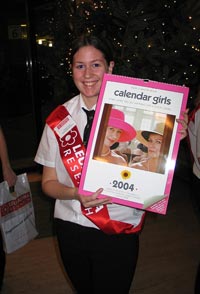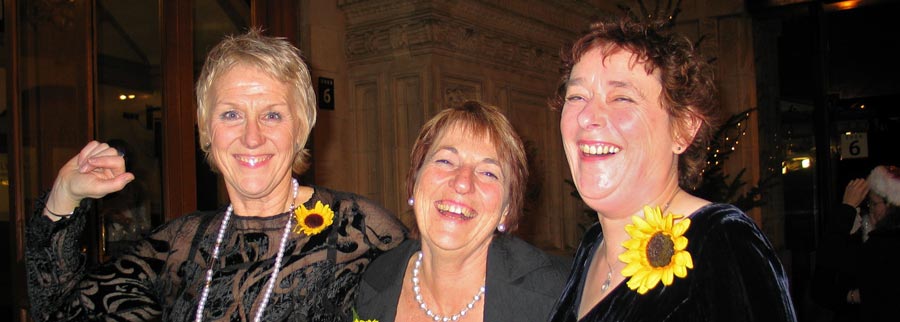What Happened to the Women who did “That” Calendar?
by Kathleen LaCamera
Yours Magazine - September, 2004
 They started off wondering if they would sell enough calendars to break even. More than five years on, those jam-making, pearl-wearing Yorkshire WI ladies who took their clothes off for charity are still at it. They’ve sold more than 400,000 calendars. They’ve raised nearly a million pounds for leukaemia research. Their story has been turned into a major Hollywood film. There’s even talk of “Calendar Girls - The Musical”.
They started off wondering if they would sell enough calendars to break even. More than five years on, those jam-making, pearl-wearing Yorkshire WI ladies who took their clothes off for charity are still at it. They’ve sold more than 400,000 calendars. They’ve raised nearly a million pounds for leukaemia research. Their story has been turned into a major Hollywood film. There’s even talk of “Calendar Girls - The Musical”.
Visitors to the Yorkshire Dales not only come asking where they can get a great cream tea, but wanting to see where the Calendar Girls story began. No matter where they go fans the world, over are still thanking the real “Calendar Girls” for inspiring them and making them feel desirable again.
So what has it been like for these ordinary women who in middle-age found themselves catapulted naked into the glitz and glare of the celebrity limelight?
“We never thought it would go so far,” confesses Beryl Bamforth, a.k.a. Miss January. “We thought it would be a one minute wonder and then gone.” The most senior of the pin ups, Beryl celebrated her 70th birthday at the star-studded London premiere of the Calendar Girls film. She’s now president of Rylstone WI, the chapter where fellow WI members, Tricia Stewart and Angela Baker first suggested the idea of a nude WI calendar.
“If I’d known we were going to sell 400,000 calendars I might have gone in for a bit of beauty treatment,” laughs Angela.
She says the travel and the celebrity lifestyle that has come with the calendar’s success has been good fun. She well remembers the first time a car that ‘took up the whole lane’ pulled up outside her cottage and Julie Walters, who plays Angela’s character in the film, stepped out.
“We just put our arms around each other as if we’d known each other forever,” remembers Angela.
During a celebrity-dense film premiere in LA, it was mega-star Kevin Costner who asked “the girls” for their autographs. On one memorable train journey to London, Angela,Tricia, Ros Fawcett and Lynda Logan heard this announcement on the PA system: “Breakfast is now being served. Will Miss February, Miss July, Miss October and Miss November please make your way to the dining car.”
Ros picks up the story. “Once we got there the steward told us the chef was so excited he wanted to serve us himself. We ordered and then in walked the chef, wearing only a pinny (apron) and nothing else! He even brought champagne!”
“You just dip in and out of stardom,” says Angela. “It can be hard coming back home. I just want to tell John about what we’re doing. He would have just loved it.”
Angela’s husband, John Baker died in 1998 of non-Hodgkins Lymphoma. He was 54. After his death, the calendar that started as a joke between friends became a means of honouring John’s life, helping others and remembering how to laugh again.
“After John died I didn’t know what to do. I think the girls got together and said we’re going to do this even if it turns out to be nothing. At least it would give me something to do.” It certainly has.
Out of the eleven women who posed for the original calendar, six sold the movie rights to their stories. Their royalties, together with others earned from calendar sales, all go to the Leukaemia Research Fund. The “Baker’s Half Dozen,” as these remaining six now call themselves, continue to raise money from talks and personal appearances.
“It’s nice to think I am here for something. I didn’t know it would be for taking off my clothes for leukaemia,” says Lynda, whose “Miss July” is rumoured to be a favourite of Prince Charles. She and husband Terry Logan are both painters and run the Chantry Hall Art Gallery in Ripley. Terry designed and shot all the photos for the original calendar. Lynda doubled as both calendar girl and props manager, raiding the family garden shed and loft for props to cover up “crucial bits” in each photo. For Terry a real thrill came when famous glamour photographer, Lord Patrick Litchfield, commented in “glowing terms” about the calendar during a radio interview.
“I was over the moon to hear what he said about my photos.”
“Before the calendar I couldn’t even do the “vote of thanks” at the end of our WI meetings,” says Miss September, better known as Christine Clancy. Christine, who is an administrative assistant at Craven College, addressed a crowd of 8000 at a screening of Calendar Girls in Lucarno, Switzerland. “I still get a bit nervous, but once I get going, I’m okay.”
While on another promotional tour, Christine and Beryl got a spontaneous standing ovation as they left a restaurant in Stockholm. “Actress Helen Mirren, who was already outside waiting for us, threw her arms around us when we came out the door and said, ‘how cool was that!’” remembers Christine fondly.
Ros too has found new confidence since that first nerve-wracking Miss November photo shoot.
“I hated taking off my clothes,” confesses Ros. “I’ve got more used to it now. But it pales into insignificance when you think of what people go through and what you good you can do. I’ve always been plump. Me not liking my body isn’t important.
“I used to have a shop in Skipton. This lovely lady came in and bought our calendar for a friend who was disfigured by facial cancer. That friend later wrote to say the calendar made her feel so good that she had gone out for first time in ages. Now that was wonderful!”
“Because of John’s sense of humour, this is just the right thing to do. He’d just be chuckling at us,” says Tricia. Both Tricia and husband Ian were among John Baker’s closest friends. In addition to teaching Pilates and writing a book about her calendar girl experiences, Tricia has set up a tour company. “Calendar Girls Holidays” offers Yorkshire Dale visitors the chance to meet some of the real calendar girls, see places where the movie was shot and get an inside view of the Dales that John, a national park officer, loved.
Family, friends and neighbours in the Dales have grown rather used to notoriety and media attention that still follows their famous “WI ladies.”
“If you wander around Skipton, you don’t get any fuss made of you,” reports Christine. “They might say, ‘Oh, I saw you on telly the other night. Again.’”
“I just direct them down the road to park,” volunteers Angela’s next door neighbour, Brian. News and television crews still come knocking on his door by mistake.
Over cups of coffee around the kitchen table of Angela’s sunlit Yorkshire cottage both, she and Tricia say they have few regrets.
“Looking back on it all, I might not do some of the ‘tabloidy’ things again, but that’s all. We’ve been very, very lucky” says Tricia.
“I’ve learned that if you have an idea and you’re positive about it you just have to go for it. If it fails - it fails, at least you’ve done your best.”
She has only recently returned to her work as a deputy superintendent registrar after a break of several years. Angela enjoys doing weddings again, but no longer registers deaths. She finds it too hard since John died.
Looking to the future, she is keeping her fingers crossed for the musical version of Calendar Girls. She says: “It would be great don’t you think? We still get letters from people saying ‘well done, good on you, girls’ from women in their 70s, 80s and even 90s. How can we not keep going?”
And That Rift Rumour?
When discussions began about making the Calendar Girls story into a movie, not of the original women involved were so keen. In her book, “Calendar Girl”, Tricia Stewart writes that the “jam hit the fan” when the group found themselves painfully divided over what to do. Five of the women made it clear they wanted comedienne, Victoria Woods to produce the film, while the others, along with photographer Terry Logan, favoured Harbour Pictures. Harbour guaranteed them involvement with the script process. In the end, Angela, whose family was most central to the story, chose Harbour Pictures.
Soon afterwards those who had supported Victoria Woods’ bid to do the film decided to retire from official Calendar Girls fund-raising activities and return to private life. “We trusted the Harbour Pictures producers, kept faith with them against substantial opposition,” writes Tricia. “That trust and faith paid off. They have made a wonderful movie.”
